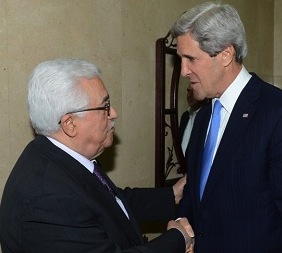Nicola Nasser, a blogger from Bir Zeit, Palestine, has delivered a stinging rebuke to John Kerry on the eve of the meetings with the U.S., Israeli and Palestinian negotiators.
Nasser’s blog, allarabi. exposed a “new tactic” in Kerry’s preparation for the peace conference, scheduled to begin Monday.
When preparations for the talks began, Kerry asked Israel’s Benjamin Netanyahu and Palestinian leader Mahmoud Abbas not to comment on the conversations they had with Kerry prior to the Washington meeting.
Sorry, Mr. Secretary, but If the Edward Snowden/NSA fiasco has taught us anything, it is this: There are no secrets in the internet age.
The U.S. Secretary of State cannot meet with a delegation from the 22-member Arab League in Petra, Jordan, as Kerry did on July 17, and expect his strategy to remain confidential.
Certainly not with bloggers like Nasser writing under this blunt headline, “Kerry Uses Arabs to Bully Palestinians”,
This is how Nasser began his posting:
A new tactic by US Secretary of State John Kerry is causing a split within the Palestine Liberation Organization (PLO) ranks regarding further talks with Israel. Kerry is apparently using the Arab League’s Follow-Up Committee on the Arab Peace Initiative (FCAPI) to bully the Palestinians into accepting new ground rules for the talks to which they had objected in the past.
In his sixth tour of the region as secretary of state, Kerry did something unusual. Instead of visiting Israel, as he always does, he left it out of his itinerary, deciding instead to hold most of the talks in the Jordanian capital Amman. While there, he conferred with Palestinian President Mahmoud Abbas as well as members of the FCAPI.
As the talks progressed, it became clear that Kerry was no longer focusing on Israel, the country that has torpedoed all previous attempts at peace, but on the PLO. His aim is to get the latter to offer more concessions than any they have accepted in the past. . . . .
The tactic is not totally new, for it resonates with the manner in which US diplomats have used the Arab League to justify foreign intervention for the sake of regime change in countries such as Iraq and Libya in the past.
The Petra meeting was hosted by Jordan’s Minister of Foreign Affairs and Expatriate Affairs Nasser Judeh. When the Jordan News Agency reported on the meeting, It remained faithful to the western narrative:
The delegation, which included Arab foreign ministers and permanent representatives at the Arab League of Bahrain, Saudi Arabia, Morocco, Palestine, Qatar, Kuwait, the United Arab Emirates and Secretary General of the Arab League, praised the efforts made by US President Barak Obama and Secretary Kerry, and their commitment to achieve peace.
The FCAPI delegates also remained in western mode:
Speaking after a meeting with Kerry in Amman, FCAPI diplomats voiced their “great support” for Kerry’s efforts to revive the talks. Their remarks were seen as a “victory” for Kerry, said the Associated Press. It was a “success” for his diplomacy, added The New York Times.
The posting first surfaced outside of Palestine in Cairo, Egypt’s Al-Ahram. Other postings , with the same harsh headline, quickly went on line in Tripoli, Libya, London’s Middle East on Line, and Russia’s Pravda, and Palestine’s The Palestine Chronicle. Across the Atlantic, it ran on CounterPunch and on Montreal, Canada’s Centre for Research on Globalization (CRG)‘s site. (Click on each link to tour through Nasser’s posting).
When Kerry initially asked participants for confidentiality, he appeared to be dropping a hint that he was working for a surprise ending. This lured some of us into hoping Kerry might revert to the fairness approach of the first President George Bush and his Secretary of State, James Baker. The choice by Kerry of Martin Indyk, former AIPAC staffer, as his point person pretty much scuttled that dream.
Of course, long gone were, dare we say it, the halcyon days of President Jimmy Carter, when a U.S. President could act as an honest broker.
MJ Rosenberg recalls those days:
The only successful U.S. mediation between Israelis and Arabs was conducted by President Jimmy Carter (right) at Camp David in 1978. Carter managed to bridge the gaps that had led Israel and Egypt to go to war three times previously by being the ultimate honest broker.
In his book about Camp David, Gen. Moshe Dayan, who was then Israel’s foreign minister, described how Carter would keep the pressure on both sides equally, telling President Sadat and Prime Minister Begin, in turn, that if the talks failed, he would publicly name who was responsible.
All during the long arduous process that produced a peace treaty that has survived 34 years, Carter refused to act as either side’s advocate. His only client was peace and that is how he achieved an agreement.
For a time, it appeared that when he brought new leaders back to Camp David, Bill Clinton would keep his promises to Israel and the PLO. Alas, political expediency appears to have led Bill Clinton astray. Israeli peace activist Uri Avnery recalls what happened:
In the past, the US has broken such promises without blushing. For example, before the Camp David meeting, President Bill Clinton gave Yasser Arafat a solid promise that he would blame neither side for a failure. (Since the meeting was convened without the slightest preparation, failure was predictable.) After the conference, Clinton put the blame squarely – and wrongly – on Arafat, a vile act of political opportunism, designed to help his wife get elected in New York.
Hundreds of Palestinians marched in Ramallah on Sunday to protest a return to negotiations with Israel. Demonstrators marched from the city center towards President Abbas’ headquarters in the Muqata, chanting slogans condemning the Palestinian Authority’s decision to return to talks.
Four Palestinian Authority police officers and three protesters were injured when both sides clashed during the march, which was organized by the Popular Front for the Liberation of Palestine.
The Palestinian street could be a serious problem, or an important ally, for Mahmoud Abbas. If he falls any further in Palestinian public esteem, no baubles he picks up in Washington will satisfy an angry public, except for the release of prisoners.
By rejecting economic assistance, and then gaining releases on all the prisoners he can get his hands on, he just might go home with no “peace accord”. After all, any “peace accord” dictated by Israel and the United States will be neither a peace nor an accord.
The picture at top of Abbas and Kerry, is by WAFA. It ran in The Palestine Chronicle.


President Abbas is not the legitimate leader of the Palestinian people.The Americans are trying to use Abbas as a puppet. We’ve been to this dance so many times before. I can almost hear President Obama’s press secretary reading his statement of “another Palestinian failure to accept the latest version” of an Israeli – USA cram down.These people are so Twentieth Century and transparently stupid.
The Kerry plan carriers no genuine agenda. Nor an equilibrium between the two sides. Assigning a staunch Zionist as US broker is another stab to the Palestinian negotiators . There has been no fairness displayed by the US throughout the history of the conflict.
One wonders why American polititions have ignored the friendly relations they can muster with the Arabs as equal to that with “Israel first)?
Since AIPAC dictated/dictates everything to the US Congress and the entire political machine Peace Will never come to the Middle East nor a true Palestinian State will be granted to the Palestinian Nation
As long as the present Palestinian negotiators accept what’s dictated to them by outside forces and not by the will and wishes of those who sacrificed over 75, 000.martyrs they are going on the wrong track of history.
Martin Indyk – ugh! Here we go again. How can a Dennis Ross or a Martin Indyk be an honest and fair broker for a legitimate peace?
As I admire Rev. Hannum’s terse, spot-on comment (as I note to him and this forum, that a long-time Kerry minion named Frank Lowenstein is Kerry’s designated assistant “mediator” to Indyk…), I’ll make a point I’ve been pondering since this latest courageous reportage by Jim Wall.
My dad, a blue-collar man with a lot of common sense, counseled my brothers and me that, when confronting a situation that seems intractable or unsolvable, we “turn the issue on its head and look at it from 180 degrees opposite; see if a fitting solution doesn’t seem magically to appear.” I’ve used that advice numerous times in my seven decades, always to a “Eureka” moment of triumph and a nod to Dad.
Here, where Indyk-Lowenstein seem to have been accepted meekly, with some mutterings of blowback by those supporting the legitimate rights and aspirations of the Palestinian people, I propose this 180-degree alternative: What if Kerry could have extracted himself from the jaws of Zionism to the extent of announcing that (I’ll pick two persons for whom I have had great admiration for years) George Bisharat, principal, and Noura Erekat, deputy, would serve as his/the American people’s “mediators” for this nine-month slog?
Can anyone not imagine the incandescent howls of outrage, the defamations of character, the overt and covert machinations (think, e.g., Chuck Schumer vs. Chas Freeman, 2009) to overturn Kerry’s decision — an overturn that would surely happen, given the disproportion of power in WashDC?
I must concede, sadly, that Dad’s “180” solution would not work here. There’s no magic in the Beltway, and none, including common sense and justice, in the offing for the Palestinians.